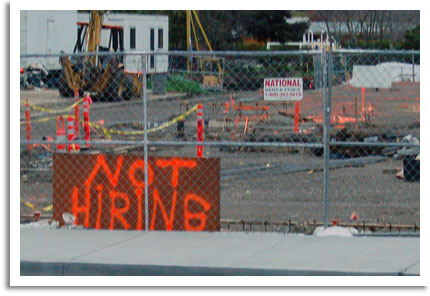Last week, I heard someone complain that the housing market was “bad.” Well, when housing appreciated 10-20% per year, I heard other people complain that the market was “ridiculous.” The truth is that the housing market has never been healthier. Now that the recession has washed away a lot of the speculative excess, housing is affordable again IF you have cash. The problem plaguing the housing market isn’t so much a crisis of confidence on the part of buyers, but the locked up credit market with wide spreads for jumbo and investment property mortgages. Once those spreads narrow, you’ll really see the pace of real estate investment accelerate.
Category: Real Estate
-
Sign of the Times: Not Hiring

Spotted the “Not Hiring” sign during the weekend. You think a few people have already stopped by to ask about job openings? From what I hear, construction work has come to a dead halt. So, any contractor that is building in this economy will be very popular. Anyways, the sign really means a lot of people are looking for work. Enough at least that it is worth it to the contractor to put up a sign.
-
Real Estate Bubble Signs
For those who were waiting for the real estate bubble to pop, the time has come. I recently glanced at some home listings from one ZIP code in San Jose, California. The listings told it all.
- Short Sale Subject to Lender’s Approval
- This is a short sale.
- Price and commission are subject to lenders approval.
- To be sold as is.
- This is a short sale listing.
- Probable short sale.
- Price just reduced.
- Short sale price.
- Terms and commissions are subject to lenders approval.
- Bank owned home.
- Short sale approved.
- REO/Bank owned.
- Terrific bank owned home.
- Bank owned REO property sold as is
- Bank owned oportunity.
-
Private Mortgage Insurance
Something just doesn’t make sense. Even if a bank extended an adjustable-rate mortgage (ARM) to a borrower with imperfect credit and required less than 20 percent down, isn’t the bank “protected” by private mortgage insurance if the borrower defaults? According to the Federal Reserve Bank,
PMI is extra insurance that lenders require from most homebuyers who obtain loans that are more than 80 percent of their new home’s value. PMI plays an important role in the mortgage industry by protecting a lender against loss if a borrower defaults on a loan and by enabling borrowers with less cash to have greater access to homeownership.
If the bank is insured against the risk of default, where are these massive write-offs coming from?
-
Real Estate Bubble
Back in 2001, a person told me that the San Francisco Bay Area real estate market was appreciating too quickly. With thoughts of the dot.com stock deflation fresh in mind, he told me that he had sold his house to lock-in his gains and will be buying a new house once the real estate bubble popped. Well, seven years later, the bloom is off the rose. However, prices still have a ways to go before they are even close to 2001 levels.
-
No Need to Panic
The financial meltdown on Wall Street “is like deja vu all over again,” to misquote Yogi Berra. Somehow, these once in a lifetime or once in a century financial crises keep occurring, well before the century has run out. With 1999-2000 still fresh in mind, we all have some frame of reference for understanding how this entire debacle will unwind.
First, the companies that you’ve never heard of will fold. We cruised past that stage about a year or so ago when all the small mortgage brokers started closing shop. Once this occurs, the grim reaper starts knocking on the door of the big boys. Any flight to quality is illusory. As we’ve all seen, even the industry giants will take their lumps. 8 years post-bubble, Cisco is still selling at roughly 1/4th of its year 2000 peak. Microsoft took a beating. GE took a beating. Everyone took a beating, well, except for Apple who has soared well past their year 2000 highs, but Apple is a special case.
In the financial realm, we’ve seen the dominoes starting to topple: IndyMac, Fannie Mae, Lehman Brothers, AIG, etc. And, as we’ve seen before, no one has immunity, not even Goldman Sachs. They’ll take their beating as well. However, we all know that Silicon Valley survived the bust and bloomed again with new roster of companies leading the charge. Wall Street will rebound once the bloodletting is done. For college students entering their senior year, make alternate graduation plans. The companies you are interviewing with this fall may not be around by next summer. Working for a big company does not necessarily offer more safety than smaller one. Until then, keep an eye out for the next bubble.
-
The Price of a Luxury Home
And luxury homes — properties listed for more than $3.5 million…
BusinessWeek just made me laugh. The above quote was from In Silicon Valley, Real Estate Remains Strong. I think a luxury house is one that costs twice as much as the one you currently live in.
-
Interest Rate Cut
The Fed’s second interest rate cut in just over a week really confused me. Instead of being merely aggressive, it appeared a bit desperate. Perhaps, the national economy is faring much worse than I had believed. The problem for home owners and real estate investors is that our perspective is often local. Easy to tell how we are doing, but difficult to see clearly how others are doing. So long as we have a roof over our heads and a steady job, any recession does not seem too bad.
If you live in an area tha has not been affected by the sub-prime crises, you might be thinking that your area is different. However, it is difficult living on an island and eventually what happens to others may also happen to us. Make sure you have sufficient savings to ride out this storm.
-
Below Market Housing: Buy Low, Sell Low
Would you believe that you can find a place in Palo Alto for under $100,000? Yes, it’s true. Under the Below Market Rate Program, a buyer purchased a 2 bedroom 1-1/2 bath residence for $98,800 back in April 2007. However, to be a qualified buyer, you must meet the Palo Alto Housing Corporation’s income and asset limits. So, what’s the catch?
With a deal this good, you have to join a long waiting list. Palo Alto Housing Corporation estimates a wait of 5 to 10 years or more for people currently seeking to join the wait list. If you are fortunate to be given the opportunity to purchase a residence under this program, well, there’s good news and bad news.
The good news is that if you finance with a 30-year fixed-rate mortgage, you can lock down your housing costs. You won’t be subject to changes in the general housing market, including interest rate fluctuations or annual increases in rent. The bad news is that unless you manage to dramatically improve your finances, you will not be moving out anytime soon. If you ever have to move, you do not benefit from the current market rate of housing in Palo Alto. Instead, you must sell to another Below Market Rate buyer at a price indexed to the Consumer Price Index (CPI). Buy low, sell low.
-
Location, Location, Location
 The problem with living in a desirable location is that everyone else wants to live there as well. Of course, when you visit open houses on the weekend, everything looks great because you never see the grinding traffic that slows down all surrounding commute lanes during the weekday. So, if you are thinking of moving to a new location, check out traffic conditions on Google Maps during your typical commuting hours and see if the drive to and from your new house to work is even manageable.
The problem with living in a desirable location is that everyone else wants to live there as well. Of course, when you visit open houses on the weekend, everything looks great because you never see the grinding traffic that slows down all surrounding commute lanes during the weekday. So, if you are thinking of moving to a new location, check out traffic conditions on Google Maps during your typical commuting hours and see if the drive to and from your new house to work is even manageable.